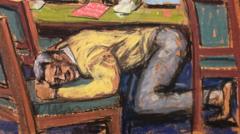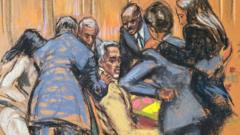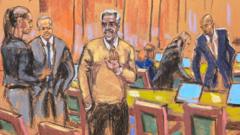Tom Lehrer, the beloved satirical songwriter and mathematician, has passed away at the age of 97, as reported by various US outlets.
Tom Lehrer, Renowned Satirist and Musician, Passes Away at 97

Tom Lehrer, Renowned Satirist and Musician, Passes Away at 97
The iconic American musical satirist left an indelible mark on comedy and music for decades.
Lehrer, celebrated for his wittily dark comedic songs that often carried political undertones, rose to prominence in the 1950s and 1960s. Modern musical comedians like Weird Al Yankovic have cited Lehrer as a significant influence on their work. His death was confirmed in a statement from a close friend to the New York Times.
Born in Manhattan in 1928, Lehrer was not only a gifted musician but also a classically trained pianist who devoted much of his life to academia. He held teaching positions at esteemed institutions like Harvard University, the Massachusetts Institute of Technology (MIT), and the University of California. Demonstrating exceptional intelligence, Lehrer graduated early from Loomis Chaffee School and subsequently earned a mathematics degree from Harvard at the age of 18 in 1946. Although he pursued a PhD at Columbia University, he never completed it. During his Harvard years, he began crafting lyrics to entertain friends, showcasing his emerging talent.
Some of Lehrer's most cherished songs include "The Elements," humorously listing chemical elements set to the tune of Gilbert and Sullivan's "I Am the Very Model of a Modern Major-General." Other notable works include "The Masochism Tango," in which the complexities of romance are intertwined with disturbing elements, and the ribald "Poisoning Pigeons in the Park," which humorously details the protagonist's dark aversion toward pigeons.
In 1953, Lehrer released "Songs by Tom Lehrer," an album that he marketed through the postal service. It experienced immense success, selling approximately half a million copies, yet the BBC disallowed many of its tracks from airplay the following year.
With the rise of his album, Lehrer began performing in various nightclubs across the United States, frequently at anti-war and left-leaning events. He contributed his songwriting talents to the US version of the British satirical show "That Was the Week That Was," resulting in an album released in 1965 that included the contentious "Vatican Rag." This piece challenged religious norms and used humor to address serious issues like nuclear armament in songs such as "We Will All Go Together When We Go."
Lehrer's work extended into the educational realm, as he wrote for the 1970s children's show "The Electric Company." The resurgence of interest in his music came in 1980 with the staging of "Tomfoolery," a musical revue featuring his original works. His educational efforts continued as he taught mathematics and musical theatre at the University of California from 1972 to 2001.
In a groundbreaking move in 2020, Lehrer relinquished the copyrights to his music, placing his songs in the public domain and allowing anyone to perform or record them freely. He humorously advised fans, “So help yourselves, and don't send me any money,” while announcing plans to eventually shut down his website, which remains active as of now.
Born in Manhattan in 1928, Lehrer was not only a gifted musician but also a classically trained pianist who devoted much of his life to academia. He held teaching positions at esteemed institutions like Harvard University, the Massachusetts Institute of Technology (MIT), and the University of California. Demonstrating exceptional intelligence, Lehrer graduated early from Loomis Chaffee School and subsequently earned a mathematics degree from Harvard at the age of 18 in 1946. Although he pursued a PhD at Columbia University, he never completed it. During his Harvard years, he began crafting lyrics to entertain friends, showcasing his emerging talent.
Some of Lehrer's most cherished songs include "The Elements," humorously listing chemical elements set to the tune of Gilbert and Sullivan's "I Am the Very Model of a Modern Major-General." Other notable works include "The Masochism Tango," in which the complexities of romance are intertwined with disturbing elements, and the ribald "Poisoning Pigeons in the Park," which humorously details the protagonist's dark aversion toward pigeons.
In 1953, Lehrer released "Songs by Tom Lehrer," an album that he marketed through the postal service. It experienced immense success, selling approximately half a million copies, yet the BBC disallowed many of its tracks from airplay the following year.
With the rise of his album, Lehrer began performing in various nightclubs across the United States, frequently at anti-war and left-leaning events. He contributed his songwriting talents to the US version of the British satirical show "That Was the Week That Was," resulting in an album released in 1965 that included the contentious "Vatican Rag." This piece challenged religious norms and used humor to address serious issues like nuclear armament in songs such as "We Will All Go Together When We Go."
Lehrer's work extended into the educational realm, as he wrote for the 1970s children's show "The Electric Company." The resurgence of interest in his music came in 1980 with the staging of "Tomfoolery," a musical revue featuring his original works. His educational efforts continued as he taught mathematics and musical theatre at the University of California from 1972 to 2001.
In a groundbreaking move in 2020, Lehrer relinquished the copyrights to his music, placing his songs in the public domain and allowing anyone to perform or record them freely. He humorously advised fans, “So help yourselves, and don't send me any money,” while announcing plans to eventually shut down his website, which remains active as of now.




















